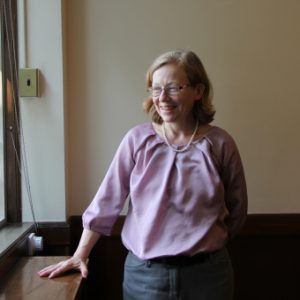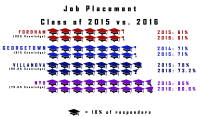
A Middle States team will arrive at Fordham in 2016 for a decennial evaluation. Samuel Joseph/The Ram
By Kelly Kultys
With less than two years until Fordham will be re-evaluated for Middle States accreditation, the university has begun its self-evaluation process.
The Middle States accreditation occurs every 10 years, so in the spring of 2016, the non-governmental affiliated organization will arrive on Fordham’s campus to evaluate whether the university has lived up to its own goals.
As stated in the Middle States Accreditation Handbook, “accreditation is a process used by colleges, universities and other institutions of higher education to sustain and strengthen their quality.”
Middle States Accreditation gives benefits to students, faculties and the universities themselves, including eligibility for federal and state student financial aid. According to the handbook, accreditation is often required for the university to receive grants, and accredited universities can only accept transfer credits from like universities.
According to Jonathan Crystal, co-chair of the self-study steering committee and an associate vice president and associate chief academic officer in the Office of the Provost, the committee’s main goal is to create a self-study report that gives an in-depth look into whether or not Fordham is fulfilling its mission statement.
“Middle States doesn’t go around saying ‘This is what your mission should be,’” Crystal said. “As long as you have a mission—and we do, Fordham has a mission statement in place—they want to know, ‘Okay, this is what you promised, are you actually accomplishing this?’”
To ensure that Fordham is in fact accomplishing what it has promised, Crystal and his committee have set up task forces to address different standards that the university claims to hold.
For example, one of the task forces looks into admissions and retentions.
Their main question, as stated in the university’s Middle States’ Plan, is “how effective is Fordham’s admissions policy with regard to marketing, recruiting and selecting the undergraduate, graduate and professional students whom the university’s mission aims to serve?”
The Middle States plan states that these task forces will give Fordham “an excellent opportunity to merge three overriding purposes into one: produce a successful reaccreditation self-study report, provide data and 13 analyses that will contribute to effective and efficient strategic planning and take full advantage of Fordham’s anniversary to emphasize its unique mission as the Jesuit University of New York.”
This self-evaluation will take almost a full school year as the committee is required to examine Fordham and its mission as a whole.
“Middle States looks at the entire university, it’s not just the academic areas,” Crystal said. “It’s finance, you know, one of the standards is institutional resources, so do you have sufficient resources to achieve your goals and how effective, efficient is the institution at making good use of these resources?”
Some of the key standards covered in the Middle States self-study which are most relevant to Fordham students include the importance of highly regarded faculty, student services and the importance of student learning. Crystal even described the Middle State evaluators as “obsessed” with student learning.
“One of the things they really stress is the assessment of student learning—in other words, we have these great classes but are students actually learning what we want them to learn?” Crystal said. “Is the university actually doing what it’s supposed to do?”
However, this is the most elusive standard to judge, as Crystal is still unsure of how to properly grade this aspect.
“How do you determine that? It’s not just grades,” Crystal said. “How do we know that we’re succeeding in what we’re trying to do?”
However, teh student services task force has an easier job in its evaulation.
“The main goal in this area, as stated in Middle States’ plan, is to answer these questions: “What student support services are provided at Fordham and how are these services reflective of the university’s mission?,” Crystal said.
“How do student support services at Fordham promote the comprehensive development of the student and how effective are these services in response to the full spectrum of diverse student populations, needs, and abilities?”
The President of the Residence Halls Association, Maria Buck, FCRH ’15, is specifically concerned with what Middle States determines for this area of their evaluation. She described Fordham’s current problem with student services as a lack of communication.
“I think just getting the word out about student services — we don’t do a great job,” Buck said. “So I think that our school does a good really job of trying to cover all the bases with student resources, it’s just that students don’t know about it. I mean, the only reason I know about it is because I’m actively involved with it.”
Another student leader, Alice Smyth, GSB ’15, was a New Student Orientation Coordinator and is heavily involved in the Commuting Students Association.
Smyth is looking to see what the self-study reports on altering the events process that students currently have to go through.
“I think that the Middle States self-evaluation should list creating either one student liaison between all the 90+ clubs and organizations or they should encourage that each of the clubs and organizations create a position on their executive boards that is solely for the purpose of dealing with the OSLCD [Office of Student Leadership and Community Development] process,” Smyth said.
Also in the student life-related standards, Christopher Rodgers, dean of students, is chairing the student complaints and grievances sub-committee. These sub-committees look at different aspects of the overarching standards.
These standards or main questions about areas of the university that were created by the steering committee will be reported to the Student Life Council in December.
Crystal says that he wants to both to show the students and administration what is going on and to receive feedback from the Council.
After the self–study is complete, the Middle States evaluators, which are a team of administrators from other universities, will get a chance to read it before they arrive on campus in spring 2016.
“They’ll have an opportunity to meet students, faculty, administrators,” Crystal said. “Basically, it’s a way to flesh out what the self-study says, make sure that the self-study is an accurate representation.”
Until then, Crystal and his committee are continuing to gather as much information as possible to finish the self-study, hopefully by the end of next semester.
__________
Kelly Kultys is the Editor-in-Chief for The Fordham Ram.




Leave a Reply